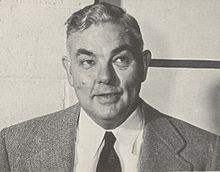 Hamilton from 1956 Owl (Pittsburgh yearbook) | |
| Biographical details | |
|---|---|
| Born | December 26, 1905 Hoopeston, Illinois, U.S. |
| Died | April 3, 1994 (aged 88) Chula Vista, California, U.S. |
| Playing career | |
| 1924–1926 | Navy |
| Position(s) | Halfback |
| Coaching career (HC unless noted) | |
| 1934–1936 | Navy |
| 1946–1947 | Navy |
| 1951 | Pittsburgh |
| 1954 | Pittsburgh |
| Administrative career (AD unless noted) | |
| 1948–1949 | Navy |
| 1949–1959 | Pittsburgh |
| 1959–1971 | AAWU/Pac-8 (commissioner) |
| Head coaching record | |
| Overall | 28–32–1 |
| Accomplishments and honors | |
| Awards | |
| |
| College Football Hall of Fame Inducted in 1965 (profile) | |
| Military career | |
| Allegiance | |
| Service | U.S. Navy |
| Rank | Rear admiral |
| Unit | USS Enterprise |
| Commands | Commander of USS Enterprise, July 10 – 29, 1944[2] |
| Battles / wars | World War II: Battle of Leyte Gulf, Battle of Iwo Jima |
Thomas James Hamilton (December 26, 1905 – April 3, 1994) was an American football player, coach, college athletics administrator, and naval aviator who rose to the rank of rear admiral in the United States Navy. He was the head coach at the United States Naval Academy from 1934 to 1936 and again from 1946 to 1947 and at the University of Pittsburgh in 1951 and 1954, compiling a career college football record of 28–32–1.
Hamilton was also the athletic director at the Naval Academy from 1948 to 1948 and at Pittsburgh from 1949 to 1959. From 1959 to 1971, he was the commissioner of the Athletic Association of Western Universities (AAWU), renamed the Pacific-8 Conference in 1968 and now the Pac-12 Conference. Hamilton was inducted into the College Football Hall of Fame as a player in 1965.
- ^ "Past Gold Medal Winners". NFF. Retrieved February 17, 2009.
- ^ "Commanding Officers". USS Enterprise CV-6 Association. Retrieved February 17, 2009.